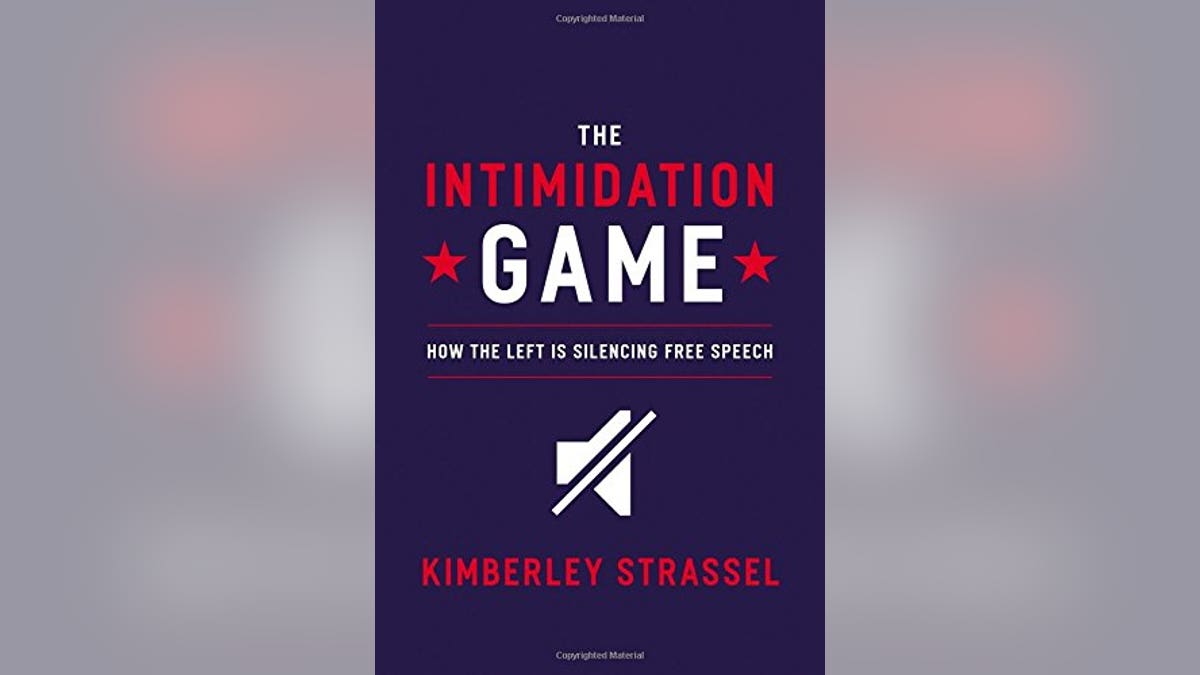
Editor's note: Fox News anchor Dana Perino talked recently with Wall Street Journal columnist and author Kimberley Strassel about her new book, "The Intimidation Game: How the Left Is Silencing Free Speech" (Twelve, June 21, 2016). To read an excerpt from the book, click here.
1. DANA PERINO: This book gives a shocking depiction of how the Left has been executing a coordinated campaign to bully certain Americans in the form of free speech. Is this something you’d been witnessing over your time as a journalist? What drove you to write this book?
KIMBERLEY STRASSEL: I write a weekly column for the Wall Street Journal, and from the moment I began covering the Obama administration I was struck by its bare-knuckle approach to politics.
When President Obama encountered pushback or resistance to his policy proposals, his response was to call out and demean his critics by name, or try to isolate them from the debate. This approach escalated as he was in office, and it helped inspire the IRS targeting scandal, attacks on conservative campaign donors, and assaults on companies that exercised their right to participate in politics.
The government abuse that I detail is not random or sporadic. It is part of what is now a large, well-honed and growing strategy to silence conservative voices.
I covered each of these events as separate events, but several years ago I realized that they were tied together. The left as a whole has taken to replicating and expanding on Obama tactics, and what we now see is a broad campaign by government bureaucracies and prosecutors, allied with liberal activist groups, to silence their political opponents.
2. What would you say is the most striking example of the Left’s campaign to censor conservatives?
The most sweeping example is the IRS targeting abuse, since it was aimed at muzzling tens of thousands of Americans during two election cycles. But the ugliest example is what happened in Wisconsin, in with liberal prosecutors launched a secret investigation into 30 conservative groups that had supported Gov. Scott Walker’s government reforms during that state’s recall fight. These prosecutors issued secret subpoenas; they staged predawn raids of private homes; they poured through the email and financial records of their targets. It was done with the intention of sending a message: Play in politics, and you will face potential criminal prosecution, harassment, and steep legal fees. It took a brave American, Eric O’Keefe, to break the gag order and bring the abuse into the open, and it took the Wisconsin Supreme Court to finally shut down the probe.

3. You say that campaign finance laws are a “restriction on the people; they empower government.” This is a hot topic during this year’s election, and most people are appalled at the amount of money spent on campaigns. But what don’t people understand about campaign finance?
In the 2012 election year, U.S. political actors spent about $7 billion to elect candidates. That sounds like a lot, until you realize that Americans spend roughly $7 billion every year on Halloween. Elections happen only every two years, so that means we spend more annually on Supergirl costumes and Milk Duds than we do choosing and electing the people who will run our country. And maybe that helps explain today’s frustration with government.
The reality is that money is a proxy for speech. Let’s say you, Dana, wanted to run for the presidency. And I said that you could only have $50 to do it. I think we could both agree that you’d have a hard time effectively getting your message out to more than 300 million Americans. Once one accepts that money enables speech, then one must accept the converse: that restrictions on money are restrictions on speech.
People today like to worry about “special interests.” The Founders had a different word for such groups: factions. And they knew that having these diverse and opposed group was a basic aspect of any society. Their answer to the tension was more speech, not less. They wanted to “faction against faction” to inspire an explosion of debate. Money helps that to happen. And speech restrictions (campaign-finance laws) usually only serve the interest of an entrenched political class, which already has a megaphone and that wants to squelch out any competition that is fueled by campaign dollars.
4. Financial Disclosure is often offered up as a solution to campaign financial concerns. Yet, you write that it discourages political speech. How so?
Disclosure can be a very good thing. But unfortunately our disclosure regime has been turned on its head. It is supposed to be a means by which citizens can know what its government, and the political class, is doing. But anyone who has followed Hillary Clinton’s server scandal or censored Orlando transcripts knows that government has become expert at hiding information.
Disclosure has instead primarily become a tool by which government and activists can monitor citizens. The left today uses forced finance disclosure as a means of rooting out the names of their political opponents, and then targeting and harassing them. “The Intimidation Game” has some truly terrible stories of, for instance, what happened to ordinary Californians who donated to support California’s Prop. 8 initiative. Activists put their names and addresses on a searchable, walkable map, and the targets suffered threats, attacks on their property, and loss of livelihood.
Some disclosure is good. But now that many political players are using it as a weapon, we need to broadly rethink our disclosure laws.
5. How did Citizens United spur a wave of liberal harassment against conservative politicians?
Both the elected right and the elected left love speech laws (campaign finance laws) because it allows them to hold down challengers and wall their political opponents out of the debate. But the left in particular had come to rely on laws like McCain-Feingold to keep companies and other free-market voices out of the political arena.
When the Supreme Court issued its Citizens United ruling, and opened the gates for those players to re-enter the field, the left was furious. They claim it is because they worry about “big, special interest” spending and “dark money,” but that is nonsense. They happily use big money and dark money themselves! What really bothered them is that they could no longer bar their critics from speaking.
In the days following Citizens United they came up with a new strategy: If they couldn’t bar opponents, they’d instead intimidate, harass and scare them out of speech. “The Intimidation Game” traces the evolution of that strategy, and how it unfolded into attacks on corporations, the IRS debacle, and many other instances of abuse.
6. The Supreme Court just upheld Obama’s executive order turning the internet into a public utility, controlled by the government. Is this an example of the politicization by the Obama administration of government agencies including the FCC?
Yes, and just one of many. I’d like to think my book is the first real telling of what actually happened at the IRS. And one big theme of that section of the book is that the IRS abuse happened because the Obama administration had politicized that agency. An IRS that viewed itself a neutral enforcer of tax law would have blocked out all the noise that elected Democrats and President Obama himself were making about nonprofits and social-welfare organizations in the 2010 midterm election. An IRS that instead felt itself an extension of the Obama administration would have instead felt compelled to act on those Democratic complaints. And it did, violating the Constitutional rights of hundreds of Tea Party groups.
7. If there is one takeaway you hope the audience gets from your book, what would that be?
I hope they learn that the government abuse that I detail is not random or sporadic. It is part of what is now a large, well-honed and growing strategy to silence conservative voices.
8. What can conservatives do to combat this liberal campaign?
Speak out when they witness such intimidation. If we know anything about bullies, it is that they like to operate in the shadows. They rely on their targets to register the fear, and then go quiet.
One of the inspiring parts of the “Intimidation Game” is how many of the targets in this book did fight back against the intimidation, and were able to get the intimidators to stand down.
This is a book that tells the tales not just of abuse, but of the free-speech heroes who fight it.








































